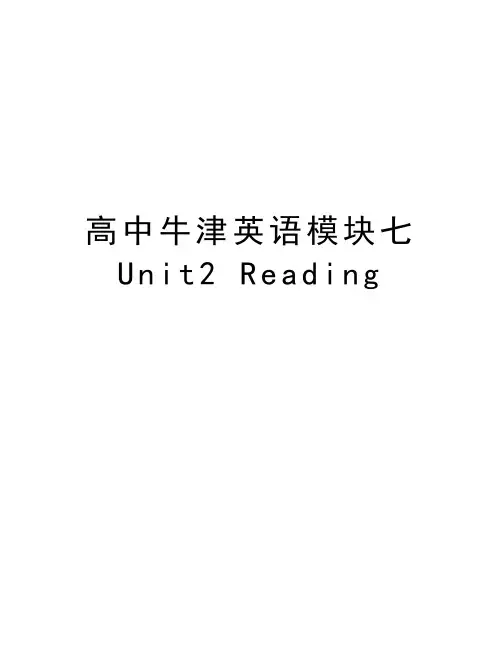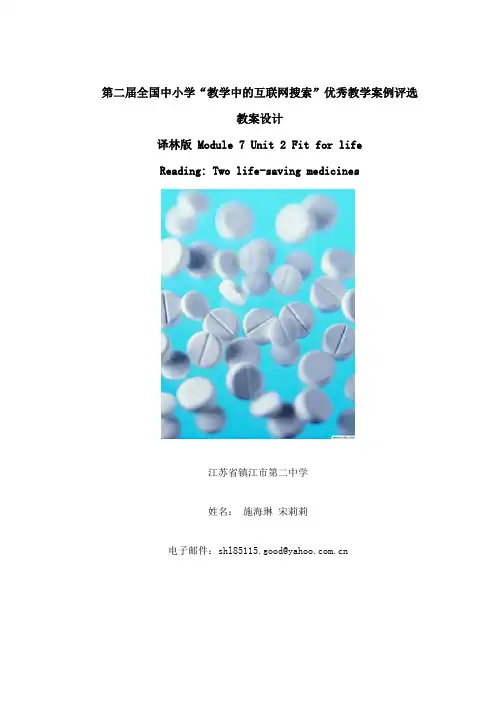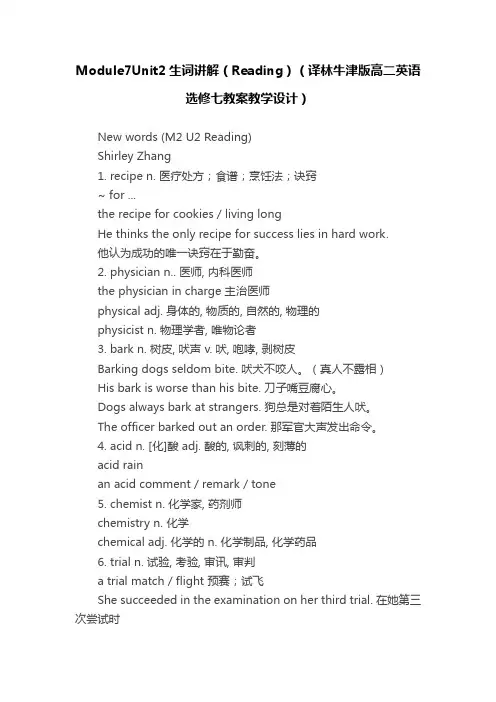Unit2 Reading 牛津高中英语模块七教案
- 格式:doc
- 大小:40.50 KB
- 文档页数:2

高中牛津英语模块七U n i t2R e a d i n gTwo life-saving medicinesThis article will focus on two drugs that started ravolutions in medicine.If you open up any medicine cupboard or go to any medicine counter in the world,it is likely that you will find aspirin and penicillin.Both of these medicines have saved millions of people's lives and have proved beneficial to mankind since they were invented. AspirinAspirin was invented in 1897.However,the basic chemical used to make aspirin can be found in nature.Nearly 3500 years ago,people chewed on leaves or drank a kind of tea made from leaves possessing a special chemical to reduce body pains and fever.About 2500 years ago,the Greek physician Hippocrates,father of alldoctors,made a juice from a tree bark containing salicylic acid for the same effect.It was in 1897 that a European chemist called Dr Felix Hoffmann produced aspirin from this chemical.The first trials of this medicine took place in 1899,when the company Hoffmann worked for began distributing the medicine in powder form to physicians to use with patients.A year later,in 1900,aspirin was sold in shops in the form of tablets.Within a short time, aspirin became the best-selling medicine in the world for pain relief.Not only has aspirin proved vital for reducing fever and helping stop pain,but there are also other things that aspirin can help wrence Craven,a doctor from the USA,introduced the idea in 1953 that aspirin had the potential to reduce the risk of heart attacks,because it helped the blood circulate better.The report wasignored.However,in 1971,Smith and Willis from the UK proved that aspirin could have that effect,and in 1977 a study carried out in the USA showed that aspirin could prevent strokes,as well.Eleven years later,Dr Thun from the USA showed that aspirin could reduc the risk of some cancers by 40 per cent.In 1999,aspirin was over 100 years old,and yet there have been more discoverise about how it can help increase the length of people's lives.In 2003,a Chinese doctor,Dr Yuan Minsheng,found that aspirin could reduce blood sugar levels and,therefore,help people with diabetes. PenicillinAnother drug that has helped increase the standard of people's health ispenicillin,which is considered by many to be one of the most important medicines in contemporary society.It was discovered by a Scottish scientist named Alexander Fleming in 1928.He noted that a dish in which he was trying to grow bacteria for an experiment looked abnormal--there was blue mould in it.It astonished him to see the bacteria surrounding the mould dead,which meant that the mould had killedthem.Fleming tried this mould out on another bacterium and found that it killed the bacterium too.He immediately realized that the mould might have an application in treating illnesses caused by bacteria.He named the liquid made from the mould‘penicillin’.However,the development of penicillin as a drug faced twoproblems.First,he was unable to find a procedure to make penicillin pure enough towork as a medicine.Second,it was difficult to produce penicillin in the ample quantities needed to be effective.In 1940,two other scientists,Howard Florey (Australian) and Ernst Chain (German-born English),helped solve these problems,and managed to make and test the new drug in large quantities.Since the new drug was needed for World War II,the government approval process for penicillin was acclerated,and mass production began in 1944.Due to the widespread use of penicillin,many lives were saved during the war.If penicillin had not been available,many people would have died from sickness or even smallwounds.Penicillin became the greatest drug of the 20th century,saving millions of lives.In 1945,the three scientists,Fleming,Florey and Chain,shared the Nobel Prize in Medicine for their work.。


Unit 2 Fit for lifeReading1Teaching aims:After this class, the students will be able to:1. gain the gist through first and second reading;2. practice students’listening ability;3. improve students’ thinking ability through discussion;4. understand some medical terms.Teaching procedures:Step 1 lead-in1. Fill in the blanksA good _________ tastes bitter.Laugh is the best ____ in the worldThere is no ______ against death.2. QuestionsWhat medicines have you ever taken? And what do you know about them? How much do you know about thetwo medicines?Who invented the two medicines?What illnesses can the two medicines be used to treat?Step 2 First readingWhen was aspirin first sold as a tablet?What did Fleming, Florey and Chain share?Step 3 ListeningListen to the article and try to answer the questions in C1 on page 20.Step4 Second readingDevelopment of aspirin:Development of Penicillin:Effects of aspirin:Effects of penicillin:Step5 DiscussionDo you believe that “wonder drugs” will be invented to treat diseases like AIDS in the future?Step 6 Reading strategyHow can we understand medical terms?Words ing from the same stem:Words that are pound words:Words with irregular plural forms:Step7 ConsolidationFill in the blanks with proper words according to the reading material.Step8 HomeworkReview the whole article, underline the phrases and words you don’t know.。

第二届全国中小学“教学中的互联网搜索”优秀教学案例评选教案设计译林版 Module 7 Unit 2 Fit for lifeReading: Two life-saving medicines江苏省镇江市第二中学姓名:施海琳宋莉莉电子邮件:***********************.cn第二届全国中小学“教学中的互联网搜索”优秀教学案例评选教案设计【百度搜索】阿司匹林资料介绍/view/1345.htm【百度搜索】盘尼西林的资料介绍/view/114422.htm(了解两种药物的资料,有助于对课文内容更好的理解和把握)Step 3: Detailed reading for important information1. Listen to the tape and read the passage a second time and complete Part C1 and PartC2.2. Read the article again and fill in the form below so that you can understand the useof the two medicines introduced in the article.Effects of aspirin●reduce fever●help stop body pains●reduce the risk of heart attacks●prevent a stroke●reduce the risk of colon cancer●increase the length of people’s lives●help with diabetesEffects of penicillin ●help in treating wounds and infections●treat other illnesses including pneumonia【百度搜索】糖尿病(diabetes)资料介绍/view/923.htm(以抢答的形式,按自然组进行评比,每组每次回答一个要点,尽量做到公平。

Module7Unit2生词讲解(Reading)(译林牛津版高二英语选修七教案教学设计)New words (M2 U2 Reading)Shirley Zhang1. recipe n. 医疗处方;食谱;烹饪法;诀窍~ for ...the recipe for cookies / living longHe thinks the only recipe for success lies in hard work.他认为成功的唯一诀窍在于勤奋。
2. physician n.. 医师, 内科医师the physician in charge 主治医师physical adj. 身体的, 物质的, 自然的, 物理的physicist n. 物理学者, 唯物论者3. bark n. 树皮, 吠声 v. 吠, 咆哮, 剥树皮Barking dogs seldom bite. 吠犬不咬人。
(真人不露相)His bark is worse than his bite. 刀子嘴豆腐心。
Dogs always bark at strangers. 狗总是对着陌生人吠。
The officer barked out an order. 那军官大声发出命令。
4. acid n. [化]酸 adj. 酸的, 讽刺的, 刻薄的acid rainan acid comment / remark / tone5. chemist n. 化学家, 药剂师chemistry n. 化学chemical adj. 化学的 n. 化学制品, 化学药品6. trial n. 试验, 考验, 审讯, 审判a trial match / flight 预赛;试飞She succeeded in the examination on her third trial. 在她第三次尝试时The man was on trial for killing a person. 此人因杀人而受审。


模块7Unit2Reading语言点讲解(译林牛津版高二英语选修七学案设计)Period 3-5 Intensive Reading1. (Page18, Line2) open up 打开;开发;开始e.g.: They opened the country up to trade. 他们开放国家,以进行贸易。
拓展be open to 对...开放的, 易受...的in the open 在户外,在野外keep one’s eyes open 留心, 注意lay open 摊开(书等)throw open 突然打开, 大开open fire on/upon at 向...开火2. (Page18, Line2)There is a high/strong probability/ possibility that……There is possibility that…很有可能/有可能类似结构:It is probable that… It is possible that…e.g.: Because he works so hard, there is a high probability that he will pass the language exam.There is little possibility of his success/ tht hw will succeed.他成功的可能性很小。
★It’s probable/possible for sb. to do sth.It’s probable/possible that…It’s likely that…sb./sth. is likely to do sth.拓展There is no doubt that +从句/there is no doubt about sth 毫无疑问There is no need for sb to do sth某人没必要做某事/there is no need that +从句没必要…It’s no use doing sth 做谋事没必要3. (Page18, Line7) recommend /rek me nd / vt. ①建议;②推荐,介绍○1作“建议”时,+ n./ pron./ -ing/ O.C. /sb to do sth[注意] 接that从句时用虚拟语气(should)do。

模块7 Unit 2 Reading (language points教学案)(译林牛津版高二英语选修七教案教学设计)M7 U2 Reading编写:周红梅审核:曹刚1.L2. open up a package 打开包裹、open up a new restaurant 开业,开张open up undeveloped land 开发 open up a medicine cupboard 打开药柜子1)The story of Helen Keller’s life opens up a whole new world to us._______________The debate could open up sharp differences between the countries.这次辩论能够_______________________.2) We're going to open up our kitchen by knocking down a couple of walls.我们准备把墙壁推倒来_____________..3)I've never ______________to anyone like I do to you. 我从来没有对任何人象对你一样地放开心扉.2.L2.There is a high/strong probability that…. 类似结构:There is possibility that…It is probable that… It is possible that…There is little probability that ______________________..= There is little probability of ______________________.=It is probable that_______________________________.留意比较:probable: adj. 很可能的,与likely意思相近,有时可以互换;possible的语气稍弱。

高二英语教学案(4)Unit2 Fit for lifeWelcome, Reading and Word powerby Li YonghuiAims and requirements1.Read an article about two important medicines and another article about Chineseacupuncture.2.Listen to a TV report on short-sightedness among Chinese teenagers.3.Talk about medicines and interview a doctor.4.Write a script for a radio program.5.Prepare and present an oral report on a Chinese medicine.The First Period Welcome to the unitStep 1 BrainstormingCan you name any jobs that relate to medicine?Step2 Look at the pictures on P17 and answer some questionsPicture1Who is the man in white?What does a chemist do?What qualities does a person need in order to be a chemist?Picture2What happens to the person?Do you know the origin of acupuncture?What can acupuncture do?Picture3What are the doctors and nurses busy doing?What do you call the doctors who perform an operation on patients?What happens during an operation?Picture4What is the girl doing?What do you call the man testing the girl’s eyes?Step3 DiscussionQuestions under the pictures on P17HomeworkRead the passage in the reading part and finish C1.C2.D and E(25m’)The second period Reading(1)Step1 Lead-inHave you ever taken medicines? What medicines have you ever taken? And what do you know about them?Step2 SkimmingRead the passage quickly and answer the three questions in part on P18Step3 ScanningRead the passage a second time and complete Parts C1 and C2.Step4 ListeningListen to the tape and finish the exercises in the Unit RevisionStep5 DiscussionDiscuss the questions in Part F on P21Step6 ConsolidationFinish the exercises in Parts D and EHomework1.Read the passage carefully and underline the useful phrases and important sentences(10m’)2. Finish the exercises in A1 and A2 on P110.(10m’)The third period Reading (2)Language points1.open up: (1) to show sth. that was hidden or not previously known:eg. 这次辩论能够揭露这些国家之间的明显差异.The debate could open up sharp differences between the countries.(2) to make a space larger or less enclosed:eg. We're going to open up our kitchen by knocking down a couple of walls.(3) to start to talk more about yourself and your feelings:eg. I've never opened up to anyone like I do to you.2.probability: noun [C or U] --the likelihood of something happeningor being true:获胜的可能性有多大? _______________________________________很可能她会来这儿. _______________________________________probable adj. --likely to be true or likely to happeneg. The probable cause of death was heart failure.注意比较:probable adj. 很可能的,与likely意思相近,有时可以互换;possible的语气稍弱。

Unit 2 Fit for life Reading 教学设计4Step 1: Lead-inHave you ever taken medicines? What medicines have you ever taken? And what do you know about them?Step 2: Fast reading for general ideasGo through the passage as quickly as possible and try to find answers to the three questions in part A on Page 18. Pay attention to the title so that you can identify the most important information as soon as possible.AnswersA 1. Aspirin and penicillin.2. In 1900.3. The Nobel Prize.Step 3: Detailed reading for important information1. Read the passage a second time and complete Part C1 and Part C2.AnswersC1 1. About 2,500 years ago.2. In 1897.3. It can also help reduce the risk of heart attacks by thinning blood,prevent a stroke,reduce the risk of colon cancer,increase the length of people’s lives and help with diabetes.4. In the mould that killed bacteria.5. It can be used to treat bacterial illnesses and other illnesses including pneumonia.6. Because Fleming discovered penicillin and the others turned it into the great drug which saved millions of lives.2. Read the article again and fill in the form below so that you can understand the use of the two medicines introduced in the article.reduce feverhelp stop body painsreduce the risk of heart attacksprevent a strokereduce the risk of colon cancerincrease the length of people’s lives● help with diabeteshelp in treating wounds and infectionstreat other illnesses including pneumonia3. Pay attention to the medical terms in the reading passage. Underline the words and put them in correct categories.Step 4: Practice:1. Complete Part D. You may refer to the reading passage on pages 18 and 19 for some help. AnswersD 1c 2e 3g 4i 5a 6h 7f 8d 9b2. Part E is about two entries in a children’s encyclopedia,one about aspirin and the other about penicillin. Please finish it.AnswersE (1) invented (2) ASA (3) tablet (4) recommended(5) published (6) discovered (7) available (8) contemporaryStep 5: Post-reading activities1. You will be divided into groups of four to introduce the development of aspirin and penicillin to。

牛津高中英语教学设计
单元:Unit 2 Fit for life
板块:Reading 1
Thoughts on the design:
本节课是一节阅读课,阅读课教学应当遵循循序渐进的规律教学,首先进行与话题相关的预热过程,其次进行精泛阅读教学结合,训练学生快速有效地寻找信息的能力,在阅读过程中穿插听力,训练学生捕捉细节的听力能力,在了解大意的基础上设置问题进行拓展性训练,培养学生思考问题的能力。
本篇是一篇介绍药物的文章,大量出现了与药物有关的词汇,因此需要向学生介绍快速了解药物词汇的阅读技巧,帮助学生在此类文章阅读方面扫清障碍。
最后,通过短文关键词填空的形式进行复习巩固。
Teaching aims:
After this class, the students will be able to:
1. gain the gist through first and second reading;
2. practice students’ listening ability;
3. improve students’ thinking ability through discussion;
4. understand some medical terms.
Teaching procedures:
Step 1 lead-in
1. Fill in the blanks
A good _________ tastes bitter.
Laugh is the best ____ in the world
There is no ______ against death.
2. Questions
What medicines have you ever taken? And what do you know about them?
How much do you know about the two medicines?
Who invented the two medicines?
What illnesses can the two medicines be used to treat?
Step 2 First reading
When was aspirin first sold as a tablet?
What did Fleming, Florey and Chain share?
Step 3 Listening
Listen to the article and try to answer the questions in C1 on page 20.
Step4 Second reading
Development of aspirin:
Development of Penicillin:
Effects of aspirin:
Effects of penicillin:
Step5 Discussion
Do you believe that “wonder drugs” will be invented to treat diseases like AIDS in the future?
Step 6 Reading strategy
How can we understand medical terms?
Words coming from the same stem:
Words that are compound words:
Words with irregular plural forms:
Step7 Consolidation
Fill in the blanks with proper words according to the reading material.
Step8 Homework
Review the whole article, underline the phrases and words you don’t know.
[Explanation]
本节课8个步骤5个层次安排:step 1 热身,引入话题;steps 2-4,通过快读和细节阅读以及听力训练了解文章大意;Step 5问题讨论,拓展性训练, 培养学生思辨能力;Stpe6介绍阅读策略,培养学生阅读和认知策略;Step7 通过段落巩固文章信息;Step8作业。
整体教学设计由浅入深、梯度上升。